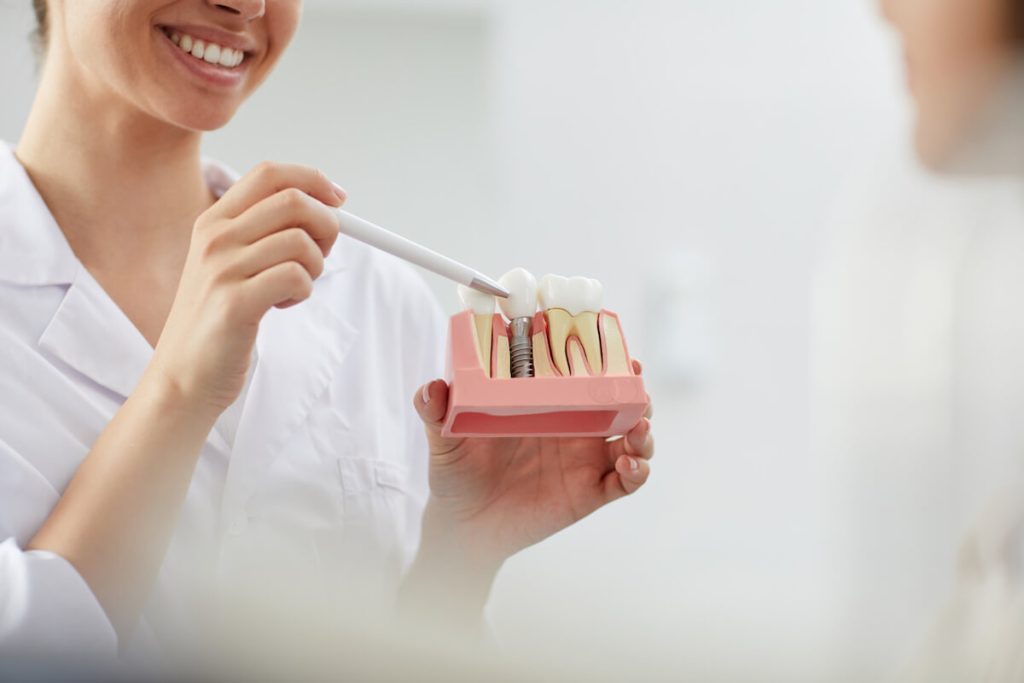Dental Implants – How Long Can They Last?

Dentistry has been entirely transformed by dental implants, providing those missing teeth with a long-lasting and attractive option. As patients consider this option, a common question arises: How long can dental implants last?
To understand dental implants’ longevity, it’s essential to explore the factors that influence their lifespan, the materials used, and the role of proper maintenance.
Understanding Dental Implants
Dental implants are the prosthetic substitution in the alveolar bone in the form of small screws made from biocompatible material such as titanium or zirconia. These implants are inserted into the jawbone and can be integrated, cementing themselves. After a certain period, when the implant integrates with the bone, a prosthesis such as a crown, bridge, or denture is fixed to give an almost natural look of a tooth.
Factors Influencing the Longevity of Dental Implants
1. Material Quality
The lifetime of dental implants largely depends on the materials’ calibre. Titanium is the most commonly used material due to its strength, durability, and biocompatibility. Zirconia is another option known for its aesthetic appeal and resistance to corrosion. Both materials have proven effective, but titanium has a longer track record of success.
2. Surgical Technique
The skill and experience of the dental surgeon are crucial factors. A well-executed surgical procedure ensures proper placement and integration of the implant, reducing the risk of complications and implant failure. Advanced techniques and technologies, such as computer-guided surgery, enhance precision and improve outcomes.
3. Bone Quality and Quantity
The state of the jawbone on which the implant is to be installed profoundly impacts its success rate. Bone density and volume are essential for osseointegration. If the bone is somehow affected, bone grafting can improve the implant site and provide long-term stability.
4. Oral Hygiene
It is crucial to note that extra care has to be taken to ensure that dental implants last longer, as the following would probably be the resulting complication: Debris and plaque can build upon the implant, and this causes inflammation, which is called peri-implantitis, which is similar to gum disease. Brushing and flossing teeth daily and visiting a dentist for cleaning are advised; this prevents bacterial growth and promotes the well-being of the tissues around the tooth.
5. Lifestyle Factors
Diet, smoking, and other related factors directly influence the life of a dental implant. Smoking threatens the body’s healing process and may lead to implant failure.
6. General Health
Overall, health plays a role in the success of dental implants. Conditions like diabetes, osteoporosis, and autoimmune diseases can affect bone healing and integration. Caring for these issues and leading a healthy lifestyle can increase implant longevity.
The Lifespan of Dental Implants
Dental implants have an extended lifespan with adequate upkeep. Clinical studies have shown high success rates, with many implants remaining functional for 20 years or more.
However, due to wear and tear, the crown or prosthetic attached to the implant may require replacement every 10-15 years.
- Early Years (0-5 Years)The initial healing period is critical. During the first few months, osseointegration occurs, and the fuses firmly with the jawbone. This period requires careful monitoring and adherence to post-operative instructions to ensure successful integration.
- Mid-term (5-15 Years): The implant becomes stable after successful integration. Routine dental examinations and cleanings are crucial to monitor the condition of the implant and the surrounding tissues. The prosthetic component, such as the crown, may show signs of wear and need replacement.
- Long-Term (15+ Years)Many dental implants function well beyond 15 years; ongoing oral hygiene practices, regular dental visits, and a healthy lifestyle influence long-term success. Even with excellent care, the prosthetic component may require periodic replacement due to normal wear.
Signs of Potential Problems
While dental implants have a high success rate, complications can arise. Recognising early signs of potential problems can prevent implant failure and extend their lifespan.
Discomfort or Pain
Persistent pain or discomfort near the implant site can indicate a problem, such as implant instability, bone loss, or infection. Consulting a dentist promptly can address the issue before it worsens.
Inflammation or Bleeding
Redness, swelling, or bleeding near the implant site may indicate peri-implantitis. Early therapy is essential to prevent further damage and guarantee the implant’s longevity.
Mobility
An implant should feel stable and secure. If it moves or loosens, a dental professional must be consulted immediately.
Changes in Bite or Function
Difficulty chewing or changes in bite alignment may indicate a problem with the implant or prosthetic. Timely adjustments can prevent complications and maintain the implant’s function.
Ensuring Longevity: Maintenance Tips
Adopting a comprehensive maintenance routine is essential to maximise dental implants’ lifespan.
- Oral Hygiene: Clean your teeth using a soft brush and fluoride-containing toothpaste twice daily. Use interspace cleaner and water to clean the area around the implant, and floss at least once a day. It is also advised that you rinse your mouth out with an antimicrobial solution to help reduce bacteria.
- Regular Dental Visits: Devise a regular dental check-up and cleaning regimen that involves trips to a dental professional. Dentists can also check the surrounding tissue and bone and identify complicated early signs of possible problems.
- Healthy Diet: Keep up a vitamin- and mineral-rich, well-balanced diet. Foods high in calcium, phosphorus, and vitamin D support bone health and oral wellness.
- Avoid Harmful Habits: Do not take alcohol and quit smoking or cut it down to as minimal as possible. Such practices may inhibit the implant’s function and pose potentialities of implant failure.
- Protect Against Trauma: Wear a mouthguard when playing sports or performing activities that might damage your mouth. Minimising trauma to the implant can prevent factors that mishandle it and reduce its service period.
Dental implant therapy, as a form of restoring teeth that have been lost, has been proven to be effective and long-lasting. If taken care of appropriately, they will last a lifetime, making the patient feel and look good. Being in a position to realise the contributing factors of these dental implants and embracing the practices to follow to enhance the implants’ durability can help them last for many years to come. Proper dental check-ups, proper dental care, a healthy lifestyle, and proper early sign and symptom recognition for potential problems are critical factors to the longevity of dental implants and to proper realisations of the advantages of having dental implants.
Dental Implants in West Ryde
Curious about the longevity of dental implants and their benefits? Learn more about how they can transform your smile and last for years. Whether you’re considering dental implants or want to know more, explore our comprehensive guide today.
At My Local Dentists West Ryde, our service and implants are 100% personalised for you.
Our dentists are all highly motivated and accredited, having graduated from the University of Sydney.
Along with the dentists, our supporting staff are highly dedicated and experienced in ensuring each visit with us is as comfortable as possible.
Contact us at (02) 9809 7000 or request an online appointment to claim FREE dental implant consultation today!
